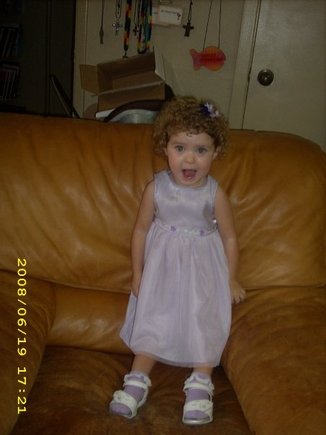
She was with her mother when it happened. (This is not to say that her mother caused the theft or that Reese wouldn’t have thieved with me by her side instead of her mom). Reese stole from a Michael’s craft store while she was there with Mindy picking up flowers with which to decorate the cross for an Easter worship service.
Apparently, while Mindy wasn’t looking, Reese grabbed a piece of fancy, clear, gelatinous soap with a bird figurine in it. Reese put it in her Cookie Monster backpack. Then she zipped the bag up and made sure not to tell Mindy what she’d done. Mindy bought the flowers, and they left the store. It seems Reese thought the soap was food and had plans to eat it.
Mindy didn’t find the soap until later in the day. She explained to Reese why this action wasn’t a good thing. Then she took Reese back to the store and had her cough up the soap along with an apology.
Thankfully, the police were not called.
I know how it happened. I mean, I know how Reese learned the mechanics of what she did.
By the age of two she’d watched us shop dozens of times. She’d seen her parents put items in bags at stores. Reese had even signed a credit card receipt for me once. At home on a number of occasions she’d picked up a wicker basket and placed all manner of things in it. When I asked Reese what she was doing, she said, “I shopping.”
She already had the mechanics of shopping down, but Reese lacked an understanding of the proper context for shopping (like the silly, cultural practice of actually paying for things with money). And without this understanding, Reese’s shopping became stealing.
I’ve noticed a similar context issue in the way I read the Bible and allow God to use scripture to influence my life. And, it’s an important issue. If you mess up the context, you can miss the real power of the story. If you miss the power of the story, you can miss Christ alive and on the move in your world, in your life.
Here’s a small example for me having to do with the “Palm Sunday” story we read the Sunday before Easter.
You might remember the story about Jesus entering Jerusalem for the final time on a humble donkey. A crowd of people line the road leading to the city gates. They spread their jackets on the road before him, wave branches, and shout praises.
I automatically put this story in the context of “Sunday religious service.” However, before it became this, the context of the actual event was more like a political protest parade.
The people were unhappy with the way their governmental, economic, and religious institutions were living. They saw Jesus as God’s answer to these problems. Jesus responds by climbing on a donkey as a way of evoking the imagery of the prophet Zechariah. In doing this, he seems to be saying, “I am your victorious ruler, but I come humbly and in peace.”
Meditate on that for a moment. The parade was about Jesus as a peaceful king seeking to change the world before it became a religious parade celebrating a Jesus who keeps our souls out after we die. How might that change in context influence how we are followers of Jesus?
If we will let it, whether it’s a Bible story, a conversation, or an action, paying attention to the proper context can shift the way we live in the world in a wonderful way. But, without a sense of proper context, bad things can and do happen.
In such a world, even toddlers shoplift.
 RSS Feed
RSS Feed